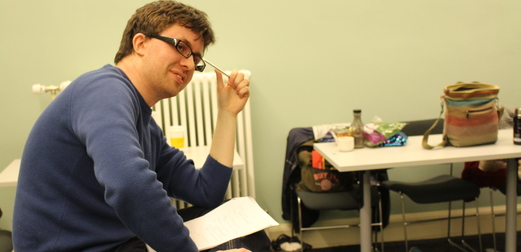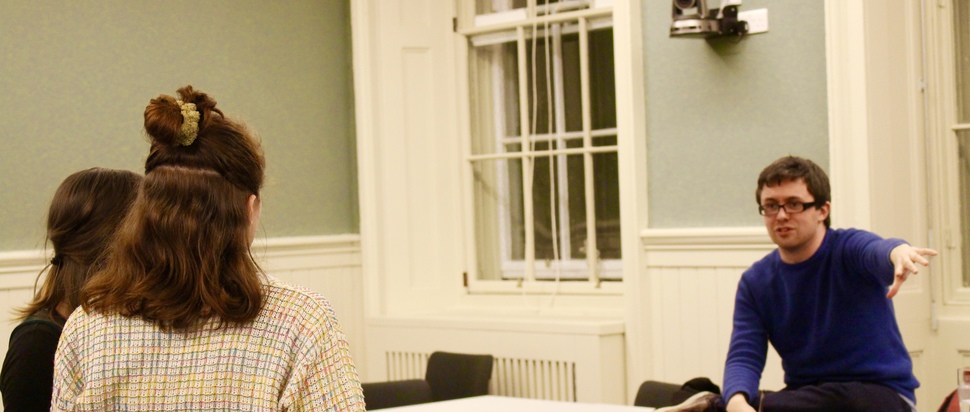James Beagon on Student Theatre
Getting involved in student theatre can be the first step to a career in performing arts. We meet Strange Town Theatre's James Beagon to find out how participation influenced his trajectory
With September comes the start of the academic year as new and returning students flock to university looking for a fresh start or new experiences. Whether that’s joining a sports team, an interest group, or a student theatre company, these opportunities allow many to try something different and discover a whole new passion. In the case of student theatre, this can also be the first step in pursuing a career in professional theatre.
That was the case for James Beagon, an Edinburgh-based director and award-winning playwright, who works as the youth theatre manager for Strange Town Theatre. He first arrived in the city to study ancient and medieval history in 2010. He admits that he initially had little interest in the performing arts, explaining that, growing up in Stockport, “I didn't really have the opportunity to do it at all so I didn't really know what I was missing out on.”
However, that changed when he saw an advert for Bedlam Theatre and Edinburgh University Theatre Company. Like many, Beagon saw his time at university as an opportunity to reinvent himself and try something new – with that in mind he signed up. The result? “A 12-year career in theatre that would not have happened had I not tried student theatre in my first week on a whim.”
While many pursue student theatre as a hobby outside of their studies, there are many who, like Beagon, come to the realisation during their time taking part that they want to make theatre professionally. For Beagon, that moment occurred towards the end of his third year upon realising that there would be a brief gap where “I wasn't rehearsing something, I wasn't writing something, I wasn't directing something. And I felt: ‘Oh, God, that's awful. I want to do more of this.’” Despite this feeling, he adds: “I don't think there was ever a moment where I sat down and said, ‘I am going to be a professional, whatever, in theatre.’ It just became natural.”
As for the experience of being involved in student theatre, Beagon found the community to be a welcoming and accessible one. However he acknowledges that “if you came to it at the wrong time, you had to be patient, you had to work your way out unless you were an actor, and you're incredibly talented.” It’s a comparison that he draws to professional theatre “in that people are more willing to take a risk on you if they know who you are.”

This isn’t the only similarity between student and professional theatre that Beagon has found during his career. While student theatre, amateur dramatics, or even youth theatre, are often looked down upon in comparison to professional theatre, he doesn’t feel that there should be that much of a distinction. In his view, “it's all actually just theatre, right? People want to give it different labels, but actually, it's exactly the same stuff. You just pay more or less for your ticket to see their show when they have more or less of a budget. And the actors have had more or less training.”
It’s an admirable sentiment and one that is certainly not without merit, especially being as we are, just out of the Edinburgh Fringe. There are numerous opportunities for students to try theatre while at university, especially in Edinburgh, be they through student theatre groups – like Bedlam, Edinburgh University Footlights, Edinburgh University Savoy Opera Group (EUSOG) and Theatre Paradok – or even off the beaten path. It was through his involvement in student theatre that Beagon was first able to take part in Fringe shows, an opportunity many who try student theatre have a similar experience of doing. This in turn led to many more opportunities, as well as gaining a wealth of experience applicable elsewhere.
To that end, Beagon encourages anyone interested in student theatre to simply give it a go. “Why not? Because you're 18 to 22, or maybe you're a postgrad. But what have you got to lose? If there's any part of you that thinks, 'I don't know if I'm really a theatre person,’ you are a theatre person. There's no such thing as a theatre person. I really encourage anyone who doesn't consider themselves one to do theatre, because you'll make theatre better just by being involved.”
